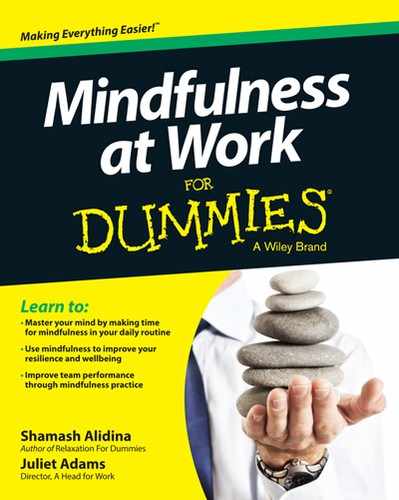Chapter 17
Ten Ways to Improve Your Brain with Mindfulness
In This Chapter
![]() Making your brain stronger
Making your brain stronger
![]() Improving your sense of well-being
Improving your sense of well-being
![]() Reining in your emotions
Reining in your emotions
Brain scans show that practising mindfulness has a physical impact on specific areas of the brain, such as those shown in Figure 17-1.

Figure 17-1: Areas of the brain affected by mindfulness.
Forget brain-training games! Mindfulness is an opportunity for the brain to strengthen and enhance itself.
Mindfulness can help you become more healthy and happy; it can even boost your social life. It can improve your sense of self-control, productivity and some say it can even make you wiser. Mindfulness is like taking your brain to the gym.
Increase the Strength of Your Brain
Did you know that practising mindfulness can strengthen your brain? Research conducted by the University of California in 2012 concluded that meditation strengthens the connections between brain cells, and that the more you practise the more you benefit.
The cerebral cortex is the outermost layer of brain tissue. It plays a key role in memory, attention, thought and consciousness. People who’ve been practising mindfulness for long periods of time have increased gyrification (‘folding’ of the cortex – see Figure 17-2), which may allow the brain to process information faster.

Figure 17-2: Brain gyrification.
Experts believe that the more ‘folding’ that occurs, the better the brain is at processing information, prioritising and making decisions.
So, to turbo charge your brain you need to help it increase its gyrification so that it can squeeze more grey matter into your skull. Your regular mindfulness practice can aid this process.
Alter the Structure of Your Brain
Practising mindfulness can help you change the structure of your brain for the better. Magnetic resonance imaging (MRI) was used to assess cortical thickness in research volunteers who were highly experienced meditators. Brain regions associated with attention, interception, emotion regulation and sensory processing (including the prefrontal cortex (see Figure 17-1) and right anterior insula) were thicker in meditation participants than matched controls, This research also suggests that regular mindfulness practice may slow age-related thinning of the frontal cortex.
Research in 2009 demonstrated that meditators have larger hippocampi (the area of the brain responsible for learning and memory – see Figure 17-1) than non-meditators.
In another academic study involving healthy people who had never practised mindfulness, changes to the brain’s grey matter were measured before and after an eight-week MBSR course. Grey matter can be found in the brain in the surface cerebral cortex, in the depths of the cerebrum and in parts of the limbic system (see Figure 17-1). MRI scans of the MBSR group revealed increases in grey matter in many areas of the brain, including the left hippocampus and the cerebellum. The results suggest that practising mindfulness results in tangible changes in grey matter concentration in brain regions involved in learning and memory processes, emotion regulation, self-referential processing and perspective taking.
Improve Your Ability to Learn
If you want to improve your ability to learn, stop what you’re doing and start practising mindfulness. Recent research demonstrates that practising mindfulness can develop areas of your brain connected with learning and memory, and even help you do better in tests.
Mindfulness practice can improve your working memory in as little as two weeks. University of California Santa Barbara researchers conducted rigorous research that demonstrated that mindfulness can reduce mind-wandering and improve working memory. Undergraduate students were given a graduate record examination (GRE) and a working memory capacity test. After two weeks of mindfulness training with an experienced instructor, those who took part saw a marked improvement in their GRE score.
A study assessing the impact of a five-week mindfulness course for adults with learning difficulties demonstrated that, among other benefits, the mindfulness training resulted in improved academic performance.
Gain More Cognitive Control
Humans have a unique ability to focus their attention on something other than the present moment. This ability allows you to learn, plan and reason, but it can also make you unhappy. Recent research used the ‘Track Your Happiness’ app to ask people to record their feelings on a moment-by-moment basis. Throughout the day the app gave users random pings, asking them to share their current activity and note their mood. Data was gathered from 15,000 people in 80 countries, with a wide range of ages, education levels and occupations. The research showed that when the mind was wandering it was less happy. Apparently the mind wanders most when in the shower and least when having sex! But, still, mind-wandering is a constant. Overall, people’s minds wander 47 per cent of the time.
It stands to reason that the less your brain wanders, the happier you’ll be. Mindfulness helps you train your brain to be more in the present moment and to respond less on auto-pilot.
Improve Your Health and Well-Being without Going to the Gym!
Did you know that mindfulness is good for your health? Research described in the American Journal of Health Promotion suggests that practices such as mindfulness are linked with lower annual health costs in the USA. While this connection may be explained by mindfulness producing an improved sense of positivity and reducing stress and depression, it may also be that mindfulness can actively boost your immunity. The better your immunity, the less likely you are to fall prey to bugs doing the rounds. In fact, mindfulness may even reduce your risk of developing serious illnesses.
The ‘fight-or-flight’ response evolved to keep our ancient ancestors safe from harm. When they encountered something life-threatening, their brains triggered a number of responses in their bodies. Blood flow, heart rate and breathing increased in order to rapidly pump energy to the muscles to help them sprint away from danger. Blood sugar levels increased to provide more energy. Blood clotting agents were released in case of injury, to stop them bleeding to death. Simultaneously, the digestive system, cell growth and repair, and the immune function also slowed down. These physiological changes make sense: if you’re facing the possibility of death, digesting food and routine body repair and maintenance are unimportant.
The human fight-or-flight response is marvellous if you need to evade short-term mortal danger. The response isn’t so good if, like many people, the greatest threat you face is crossing a road or driving on a busy motorway. Worrying about your job, family or money can lead to you living life in a permanent state of heightened arousal. While in this state, normal bodily repair and the immune function are reduced. Mindfulness is very effective in reducing stress levels. When your stress levels are reduced and your normal bodily functions resume, the immune system starts working properly again, and you’re much less likely to fall ill.
Too busy to practise mindfulness? Remember, your mind wanders for around half of your waking hours. Mindfulness can help you reduce this mind-wandering. In the time you save, you can practise mindfulness and improve your health and well-being. Just 15 minutes of mindfulness practice a day can make all the difference. You do the sums: you’re awake for roughly 15 hours a day, seven days a week – that’s 105 hours; your brain wanders 47 per cent of the time – that’s 49 hours. So, if mindfulness can help your brain wander less, for example by 10 per cent, you save five hours. With five hours extra a week, you can easily fit in 15 minutes of mindfulness a day and still have more than three additional hours to do with as you wish. If you’re off work with a bug for three days, you waste 45 waking hours. Practising mindfulness for 15 minutes a day for half a year takes less time!
Many people stagger through the working week, then flop on the sofa and succumb to illness at the weekend. Just 15 minutes of mindfulness practice a day can prevent this pattern. In bed with flu or out with friends having fun? Surely it’s a no-brainer!
Mindfulness is also good for your health because it can help you sleep better. A University of Utah study found that those with higher levels of mindfulness had lower levels of brain activation at bedtime – in other words, their brains weren’t full of random thoughts, fears and concerns. A good night’s sleep is vital if you want to work effectively the next day.
Live Life with Less Fear
Did you know that mindfulness practice has been proven to reduce the fear centre of the brain – the amygdala? The amygdala (see Figure 17-1) triggers your fight-or-flight response when things happen that your brain regards as threatening.
Mindfulness makes you more aware of your thoughts as they arise. This awareness helps you to reduce your brain’s auto-pilot response, allowing you to consciously decide how you react to threat. In approach mode of mind, your brain approaches what’s going on in your life with openness and curiosity. In avoidance mode of mind, your brain’s primary motivation is to avoid something bad happening.
Imagine that you’ve just been told that your small, UK-based company is being bought out by a large multinational organisation. In approach mode of mind you look at all the possibilities this buy-out offers, good and bad, with openness and interest. In avoidance mode of mind, you’re driven by fear and your primary motivation is to avoid harm. This perceived harm may be a loss of reputation, a reduction in status or damage to your financial well-being. In avoidance mode of mind, you’re less able to look at the situation objectively and more likely to identify the negative things that may happen as a result of the buy-out, such as job loss, demotion and the threat to your home life.
When you feel threatened, your primitive brain may take control and your rational brain is thus less engaged. Mindfulness helps you to adopt an approach mode of mind that is less likely to trigger your threat system. By finding out how to approach rather than avoid challenging situations, the perceived threat is usually reduced. Your rational brain then remains in control, helping you to respond in a wiser, less fear-driven way.
Two final things to consider when exploring the brain’s response to fear are empathy and compassion. Mindfulness can help you to become less judgemental and hard on yourself, which can improve your self-compassion. Self-kindness can reduce or even de-activate your brain’s threat response. The simple act of saying to yourself, ‘It’s okay, I’m human, I’m doing the best I can’ can help you to relax and let go, and make everything feel less threatening. When you let go, you’re better able to stand back and look at what’s going on calmly and rationally.
Make Yourself Happier
It’s official! Mindfulness can make you happier. Studies into depression and low mood suggest that the right brain of people who are depressed becomes more active. The right brain tends to react more emotionally than the left brain. The right brain is great for spotting patterns and connections, and is highly creative but needs input and guidance from the left brain. Over-reliance on the right brain can lead you into an emotional fog, which seems endless and difficult to break out of.
Depression often starts with a sense of prolonged uncontrolled stress. In this situation, your brain releases the stress hormone, cortisol. At this stage, your left brain usually kicks in to balance things out, but in depressed people this kicking in doesn’t always happen. When your cortisol levels are high for prolonged periods, your right brain becomes much more active than your left brain. With an underactive left brain, it becomes difficult to be cheerful, positive or socially outgoing. Without the left brain coming to the rescue with a present-moment reality check, you can easily feel pulled into a downward spiral of negativity and helplessness.
Brain scans show that, when people practise mindfulness, their left brain becomes more active. The left brain is associated with logical thought and current reality. It also plays an important role in making plans for the future. Increased left-brain activation is associated with better mood and increased objectivity.
So, if you’re feeling down, stop what you’re doing, sit down and practise mindfulness. Doing so can help you put things into perspective and regain your equilibrium.
Regulate Your Emotions More Effectively
A 2011 study published in Psychiatry Research: Neuroimaging concluded that mindfulness can induce emotional regulation, clear thinking and brain plasticity (see Chapter 1). In a randomised trial, the MRI scans of those participants who practised mindfulness showed increases in grey matter/nerve cells in the hippocampus (see Figure 17-1). Participants in the control group showed no change in grey matter.
So why would you want to increase hippocampus grey matter? The hippocampus is associated with emotional regulation. The better able you are to regulate your emotions, the more you gain a sense of well-being. Feeling that everything is okay clearly leads to experiencing a higher quality of life.
Mindfulness training can also have a progressive impact on the limbic system, the area of the brain associated with emotions. Mindfulness has been shown to reduce activity in the amygdala, an area of the brain that helps you to modulate your response to fear. People with an active amygdala tend to experience more depression and anxiety. Practising mindfulness can actually reduce the size of the amygdala. One study conducted with stressed executives found that eight weeks of mindfulness training resulted in a reduction in the size of the amygdala. This reduction was correlated with less perceived stress. Can you believe it that just eight weeks’ training can change your brain forever?
Improve Your Life without Even Trying
Throughout this book we encourage you to make mindfulness part of your life, and emphasise the importance of practice to embed your skills and reshape your brain.
Findings from a recent study reported in the Frontiers in Human Neuroscience journal demonstrate that you don’t actually need to be practising mindfulness to benefit from it! Practices like mindfulness change the way your brain processes emotions, and help you step away from habitual responses and behaviours. Regular mindfulness practice changes how your amygdala (the brain’s fear centre) responds to emotional stimuli. This change is maintained even when you’re not actively sitting down practising.
So, a little mindfulness practice on a regular basis has long-lasting positive benefits that continue even when you’re not doing it!
Improve Your Attention Span
In 2012, researchers from the University of Washington examined the effects of mindfulness on multi-tasking in a real-world setting. A group of human resources professionals were placed in a one-person office, with a laptop and a phone, and asked to complete several typical tasks: schedule a meeting for multiple attendees, locate a free conference room and write the agenda. They were allowed to use email, instant messaging and the phone as they normally would, and were given 20 minutes to complete the multiple tasks.
Half of the group was then given mindfulness training, and the other relaxation classes. Everyone was then asked to multi-task again.
Only the mindfulness participants showed improvement. Their ability to concentrate had improved significantly. They were able to stay on task longer and they switched between tasks less frequently. The overall time they took to complete the tasks did not change; they just spent it more efficiently. They also remembered what they did better than the other participants in the study.
The concentration benefits of mindfulness training aren’t just behavioural; they’re physical too. Mindfulness has been shown to improve connectivity inside your brain’s attentional networks, which results in reduced distractions. Practising mindfulness can help your brain’s attention networks communicate better and with fewer interruptions than they otherwise would. Good news indeed!

 The more you live your life based on direct experience (present-moment facts), the less likely you are to default to habits and unconscious auto-pilot responses. The more ‘present’ you are in your own life, the less time you spend on auto-pilot and the more in control and happy you’ll be.
The more you live your life based on direct experience (present-moment facts), the less likely you are to default to habits and unconscious auto-pilot responses. The more ‘present’ you are in your own life, the less time you spend on auto-pilot and the more in control and happy you’ll be.